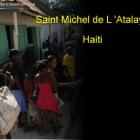Jean Dominique and the Duvalier Era
ADVERTISEMENT
Because of his efforts, which included showing peasant farmers how to avoid being in debt to wealthy landowners, Dominique was imprisoned for six months due to the connivance of the landowners who convinced the authorities to jail him so they could hold on to their control over the peasants. Upon his release from jail, he became a fierce detractor of François 'Papa Doc' Duvalier and his militant regime.
He would continue to oppose this regime, as well as that of 'Baby Doc', Jean-Claude Duvalier, and would later find himself exiled to New York after the independent radio station he founded in the early 1960's, Haiti's first outlet to broadcast Creole, named Radio Haiti Inter, was shut down multiple times by Duvalier after Dominique's harsh criticisms against the government. He had initially joined the station, then called Radio Haiti, as a reporter, but had bought the lease in 1971 and began a fierce campaign for democracy in the electoral process as well as economic and social justice. He'd made another sizeable investment into the broadcast field with the founding of Haiti's first film club in the 60's. He would later go on to make 'But, I Am Beautiful', one of Haiti's first documentaries.
Upon his return from exile in 1986, after spending six years in America, he was met by 60,000 people with the suggestion that he run for president. This he declined to do and later joined the Lavalas party, which would win the elections in 1990.
Read more: jean dominique, Prison, Creole, Media, Francois Duvalier, radio, Movies, Lavalas, Exile, Social Movement, Criticism, Radio Station, Radio Host, Radio Haiti Inter, Democracy, Social Justice, People
« Kita Nago, from Les Irois to Ouanaminthe, a symbol of Haitian Unity | Main | Marleine Bastien, on the Frontlines of Immigration Reform »
Leave a Reply
Name (required) E-mail (required, will not be published)
» »
Our objective is to share with you news and information about Haiti and the people of Haiti. Traditions, habits and the way we were or grew are alive in this site. We highly recommend that you Subscribe to our Newsletter and also share with us some of the things that are memorable and made us unique people.


 Saint Marc, Haiti
Saint Marc, Haiti  Battle of Vertieres
Battle of Vertieres  Something to think about
Something to think about  Saint Michel de L 'Atalaye
Saint Michel de L 'Atalaye  Haitian Creole Translation
Haitian Creole Translation